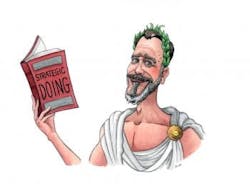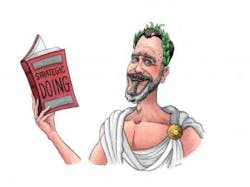The Manufacturing Philosopher Column: Are your people flailing or flourishing?
By Scott Hutcheson, PhD, Senior Lecturer of Organizational Leadership at Purdue University
A few years ago, I served on a task force focused on building a talent pipeline in key industries like
Scott Hutcheson...The Manufacturing Philosopher
healthcare and manufacturing. It was a gathering of leaders from industry, government and education, all interested in assuring that there was alignment between skills needs and the curriculum being taught in our educational institutions.
One of the people I met at this meeting was Martha. She was a middle-age woman with a quiet manner. Quiet until she started to talk about her work. As we chatted over coffee and bagels during a break, I asked Martha what she “did.” It’s not a very eloquently phrased question I admit, but it’s one that is nearly universally understood as an inquiry about what a person does for work. When I asked, Martha’s face lit up as she told me, “I help save the lives of babies born prematurely. It can be stressful work; but so rewarding. I can’t imagine doing anything else!”
Martha graciously went on to ask me about my work in the few remaining minutes before the meeting resumed.
During the second half of the meeting, I was pleased to see that Martha was part of a panel discussion. I was looking forward to hearing more from here. Although she didn’t tell me her specific role in neonatal medicine I presumed her to be a doctor, or perhaps a nurse. As the panel began, however, I learned that Martha was a line worker in a local factory that made infant incubators. Yet, she was speaking about her responsibilities with as much reverence and passion as any doctor or nurse might. Martha didn’t think of herself as a “factory worker,” but as someone who helped save the lives of premature babies.
Martha was flourishing in her work.
At the university where I teach, one of my courses is called Leadership Philosophy. Toward the end of the semester, I ask our students to develop their own personal leadership philosophy. In the earlier part of the course, we look to different schools of philosophy to see what we can learn that can help us become better leaders. We look at the ancient philosophers as well as some more contemporary thinkers. As it turns out, a great number of philosophers were interested in this notion of people being able to flourish. Different thinkers had different takes on flourishing.
Aristotle thought people flourished when they had the ability to reason for themselves. Nietzsche gave us the idea that those who break from the herd to become high-performing ubermen are the ones who truly flourish. Karl Marx worried that the industrial age would bring on a dehumanization of the factory worker, crushing the life out of people. Buddha suggested that we flourish when we understand our interconnectedness.
Now, “flourishing” probably isn’t a term most of us use much around the workplace. It seems a bit out of fashion. We talk about “productivity” and “engagement.” We tell our people to be “good team players.”
But what if we focused on flourishing? If we did, might it get us to all those other things?
There’s interesting research that says employees who describe themselves as flourishing have higher levels of job satisfaction, are more committed to their organizations, put greater thought and effort into their work, are less likely to leave and have fewer sick days and workplace accidents. Researchers Ed Diener and Robert Biswas-Diener have developed a widely-used flourishing scale. The degree to which we have the following things in our lives, including our work lives, often determines to what extent we are flourishing:
- Purpose and meaning
- Supportive and rewarding relationships
- Engagement and interest in daily activities
- Opportunities to contribute to the happiness and well-being of others
- Competence and capability in activities that are important
- Optimism about the future
- Respect from others
You can find the Diener and Diener’s assessment here. I urge you to take it yourself.
What if you thought of your #1 responsibility on the job as helping your peers flourish?
Imagine having an entire workforce made up of people like Martha, the woman who helped save the lives of premature babies. I don’t know if Martha was a Marxist, a Buddhist, an Aristotelian, a Nietzschean, or what; but I’m pretty sure she was flourishing.
Bio: For more than 30 years Scott Hutcheson has been helping current and future leaders design, manage and strategically transform organizations and ecosystems to make them more adaptive, innovative and competitive. He teaches for Purdue University and is also co-author of Strategic Doing: Ten Skills for Agile Leadership. Learn more about Scott here.

